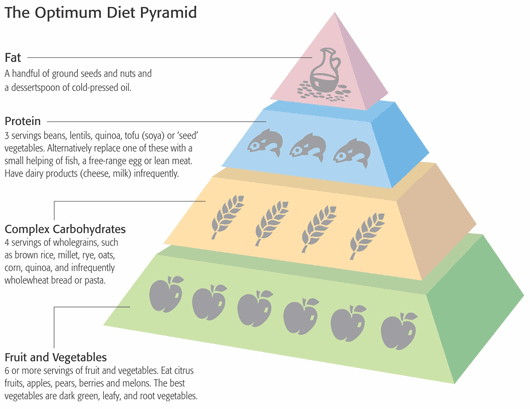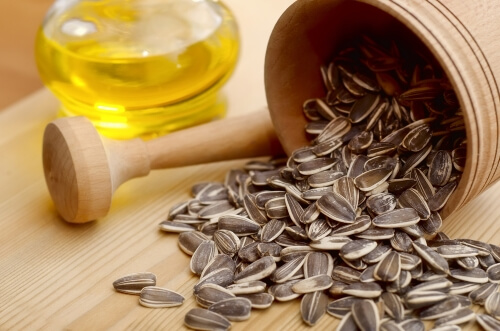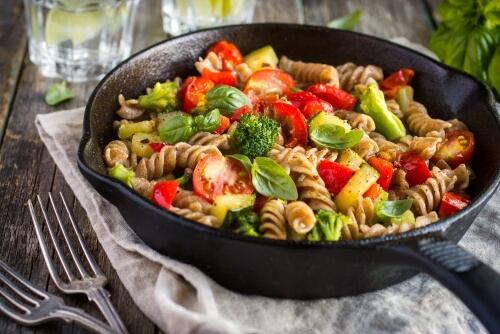However, achieving a healthy, balanced diet can be elusive for many of us.
That’s why by the end of this article you’ll know what foods to put on your plate, and why, so that you can make the necessary changes to make you feel great.
Our bodies require a combination of fats, proteinProteins are large molecules consisting of chains of amino acids. Proteins are essential nutrients for the human body – they are a building block of… and carbohydrates in order to function properly but it’s the specifics of these that makes all the difference, and we’ll go into each below.

FatThere are many different types of fats; polyunsaturated, monounsaturated, hydrogenated, saturated and trans fat. The body requires good fats (polyunsaturated and monounsaturated) in order to…
Fats are often given a bad reputation but in fact some fats are actually ‘essential’ for health and wellbeing.
There are two fats which are referred to as essential as they cannot be produced by the body, which means their inclusion in your diet is critical. These essential fats are omega 3 and 6, often found in seeds and their oils. They are key in supporting many of our body’s functions including the nervous system, immune system, cardiovascular system, and ensure healthy looking skin and brain cognition.
These essential fats, however, are easily destroyed in food especially when heating or exposing them to oxygen, this makes it all the more important to have a fresh daily source of them.

Protein
Protein is vital for growth and repair in the body. Both the quality and quantity of the protein you eat are equally important. It’s recommended that about 15% (and not more than 20%) of your total calorieCalories are a measure of the amount of energy in food. Knowing how many calories are in the food we eat allows us to balance… intake should be from protein, or around 40 grams a day.
Some of the best quality sources of protein include foods such as eggs, quinoa, soya, meat, fish, beans and lentils. Whilst one of the best sources of protein has previously been meat it’s now recommended that meat intake is limited to three times a week. This isn’t a worry though as there are many good ‘seed’ foods like runner beans, peas, corn or broccoli which provide a good level of protein and act as a suitable alternative to meat for many vegans and vegetarians.

CarbohydrateCarbohydrates are the primary source of energy for the body as they can be broken down into glucose (sugar) more readily than either protein or…
Carbohydrate is the body’s main fuel. Eating ‘slow releasing’ low GL (glycaemic load) carbohydrates from things like whole grains, vegetables and fresh fruit helps to balance blood sugar, providing sustained energy levels. In addition, they are also packed with vitamins and minerals, often missing from fast-releasing carbohydrates such as white bread and cakes.
Slow-releasing carbohydrate foods also have their place and should make up about two thirds of what we eat, or around 65 per cent of our total calorie intake.

FibreFibre is an important part of a balanced diet. There are two type of fibre; soluble and insoluble. Insoluble fibre helps your bowel to pass…
The ideal intake of fibre is not less than 35 grams a day. It’s easy to get this amount of fibre, by eating whole grains, vegetables, fruit, nuts, seeds, lentils and beans on a daily basis. Fibre helps the body absorb water in the digestive tract making the food contents bulkier and easier to pass through the body.
Fruit and vegetable fibre specifically, helps to slow down how quickly sugar is absorbed into the blood, helping to maintain good energy levels, while cereal fibre is particularly good at preventing constipation and putrefaction of foods, which are underlying causes of many digestive complaints.
In summary
It’s important to get a good balance of all of these foods in your diet each day to help you stay healthy and feel great. It will also result in you consuming a good quantity of the vitamins and minerals you need which are vital for so many processes in the body like making hormones, producing energy and building your bones and teeth.
For more tips to help support your body, and create your own balanced diet read our Top Ten Tips for Perfect Health.
If you’d like a diet, lifestyle and supplement programme that is tailored specifically for you then try our online 100% Health Programme. Simply complete a questionnaire online and you’ll receive the key to your perfect diet. Click here to start.
To find out more about optimum nutrition read The Optimum Nutrition Bible or The Optimum Nutrition Made Easy.

Comments
Join the Conversation on our Facebook Page